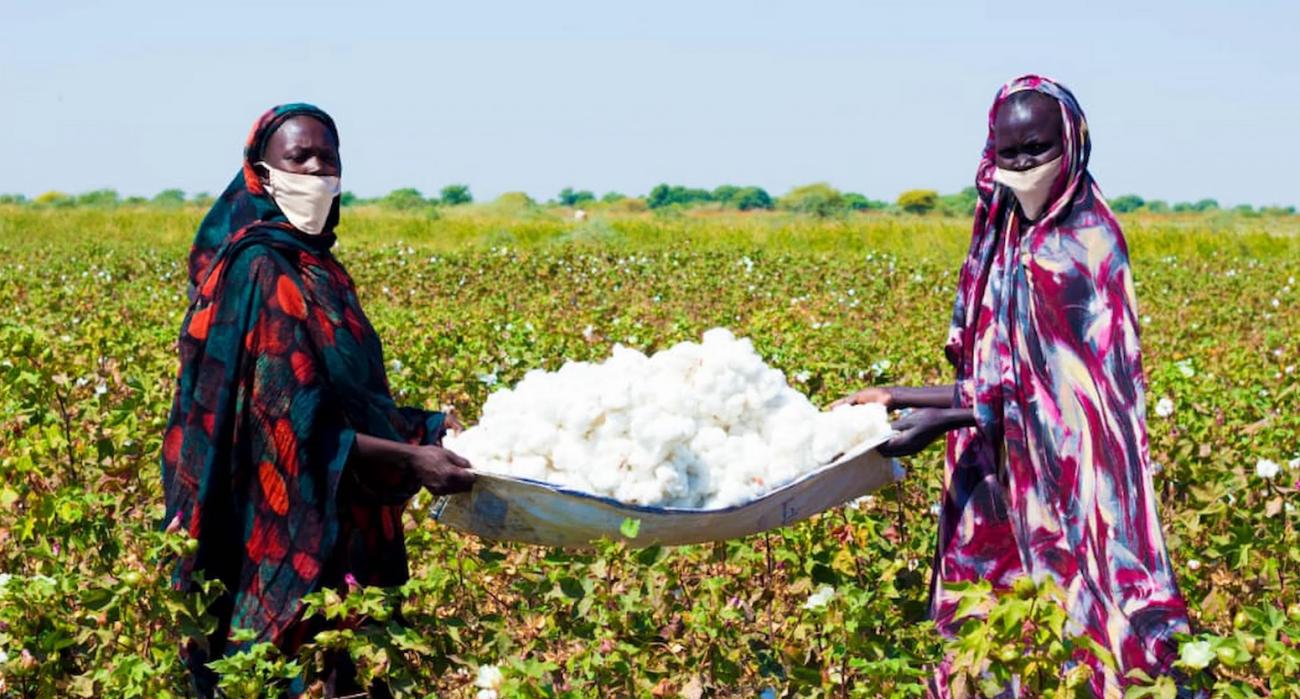Cotton, stability, and 24,000 opportunities in Sudan’s White Nile

In White Nile, support for rural development has created 24,000 jobs, and opportunities for communities and refugees to work together
- Rural development, including 86km of new irrigation canals, has created 24,000 seasonal jobs – 11,000 from cotton farming – and supported stable communities in White Nile State.
- Following initial UNDP investment, with support from SIDA and the Netherlands, cotton production grew from 67,500 kg to 360,000 kg (433%) – enough for 1,600,000 t-shirts.
- Local private sector partners have been secured, ensuring sustainability, and providing greater profits for farmers – and reinvestment in the community.
- Relationships between refugees and host communities have improved following an increase in opportunities and incomes.
“The seasonal work on the cotton harvest helped me earn 400 [Sudanese] pounds a day, and buy food for my children and clothes. Work is closer to the Jouri camp, which makes it easier to look after my family.” – Terisa Josef, mother and South Sudanese refugee.
Mother of five Terisa Josef (above left) is one of almost 12,000 South Sudanese refugees calling Jouri Refugee Camp home – one of nine camps in the State – alongside neighbouring local communities. For locals and refugees alike, opportunities have been limited, creating competition for work and resources.
But, a combination of rural development and White Nile’s agricultural potential has seen 24,000 seasonal jobs created for both groups – primarily via cash crops like cotton (where production grew 433%) and wheat.
Key to this has been UNDP-led, Swedish International Development Cooperation Agency (SIDA)- and Government of the Netherlands-supported civil works to create 46 km2 of irrigated farmland.
Fed by 86km of new or rehabilitated canals, increased water from the While Nile has improved productivity dramatically.
This has been accompanied by training and equipment, the creation of locally-led ‘Community Management Committees’ to oversee operations - and partnerships with the private sector and State Ministry of Agriculture.
The results have been significant, notably an increase in total cotton harvested from 67,500 kg (in 2015) to 360,000 kg of lint cotton – enough for about 1,600,000 t-shirts.
Total income increased from 700,000 SDGs to 216,000,000 SDGs. Sale of cottonseed supplemented this, growing from 96kg per acre to 512kg, providing an additional 51,200,000 SDGs of income.
After investing to ensure success during the first season’s planting – resulting in a significant wheat crop, and the subsequent cotton harvest – private sector partners have been attracted to replace UNDP’s support and ensure sustainability for the initiative.
Local business Balla Bushra for Commercial Enterprises joined the initiative, providing finance to the 400 farmers to cover seeds, equipment, labour for planting and harvesting, training and transport, as well marketing support and links to processing plants and exporters.
Building on prior UNDP assistance the firm also funded State Ministry of Agriculture experts to provide training on cotton farming best practices, addressing knowledge gaps for large-scale production following years of subsistence farming by the community.
Slman Adam, head of the local agricultural production committee, said: “The partnership helped us produce more cotton per acre and gain experience via agricultural training.”
“The partnership also helped provide services for the community, and increased profits that helped buy solar-powered equipment, pay fees for health and education, and bring stability for the local farmers.”
Beyond economic advantages, the creation of new opportunities and collaboration has improved ties between the various groups in the area.
“We deeply appreciate the participation of the South Sudanese from Al Kashafa [a nearby camp],” said local farmer Younis Elnoor Adam, “their work helped us achieve the harvest on time.”
Younis now cultivates three acres of cotton and has been employed as a driver by Balla Bushra working alongside and employing members of nearby refugee communities.
With another successful harvest concluded, the farmers, community management committee and Balla Bushra are already onto the next season – more than doubling the farmland utilized and people employed.
“Following the initial civil works and support investment by UNDP, the private sector has been able to step in and expand the opportunity, helping tens of thousands with urgently needed jobs,” said Osama Tageldin, Head UNDP Sudan’s stabilization programme.
“At the same time, we’ve structured the partnership to ensure labour needs provide opportunities for refugees and local communities, ensure a portion of profits are reinvested into local development projects prioritised by the community, and create a sustainable business model.”
“This is exactly the type of opportunity we are looking to expand with the private sector, focusing on local employment, peace, and rural development.”
Peace and stability are essential for development in Sudan. That makes them UNDP’s top priority. Our approach provides support on the national, state and local levels, combining efforts to address conflicts and their root causes. We aim to improve access to basic services, employment opportunities and fulfilment of essential needs for people all over the country. Additionally, we implement peacebuilding initiatives and provide conflict mediation to address problems when they occur. In 2020, UNDP supported half a million of Sudan’s most conflict-vulnerable people through stabilization projects.




